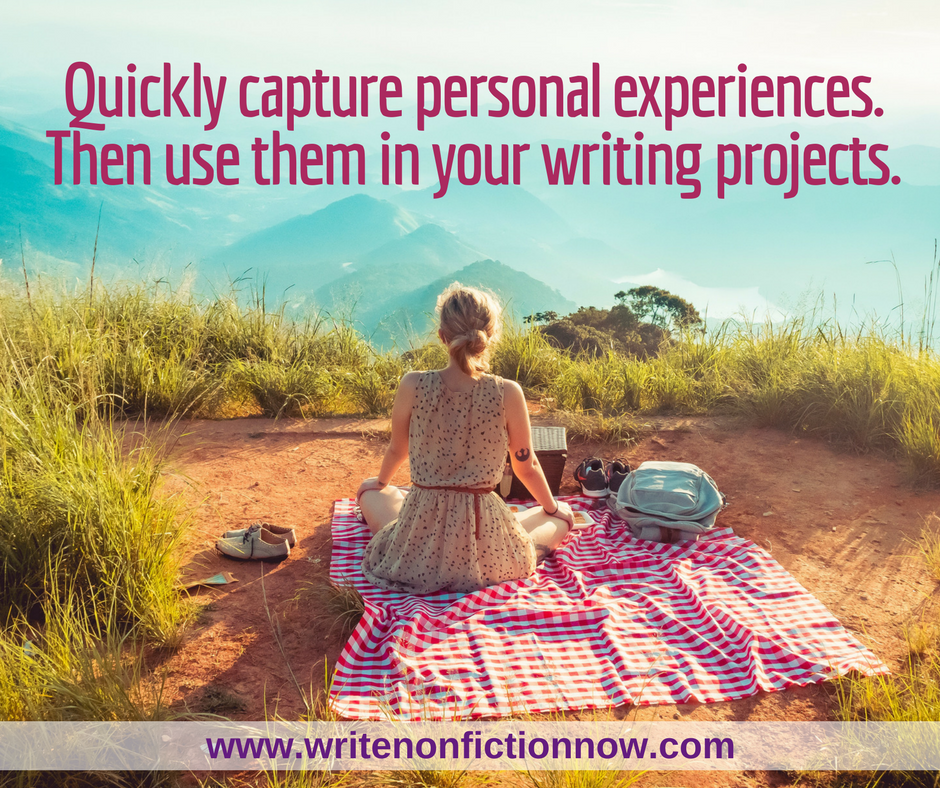Are you capturing your personal experiences and using them for your writing projects? If not, it’s time to consider doing so. After all, you are a nonfiction writer, and nonfiction writing is based on real—and personal—experiences.
Some of my magazine articles have reached millions of readers (no exaggeration). Many of these articles were based on personal experience and required little or zero research. The articles were centered on a detailed telling of my experience.
For instance, years ago, we taught our oldest son about death through the experience of my second son’s short life. I intentionally wrote down what happened almost immediately. In this raw material, I captured dialogue and details I might forget later. I used this experiences and my notes about it to create the backbone elements of a magazine article—a personal essay.
Almost every publication (large and small) uses personal experience articles or essays. What steps are you taking to write your experiences shortly after they happen?
5 Ways to Write About Personal Experiences
Our personal experiences can be written about and used in many different ways. Here are several:
- Personal Experience magazine articles. Your personal stories can be used in many kinds of publications. The category of personal experience articles is almost universal for the print magazine world. High circulation glossy publications use them as well as trade publications. I’ve written for both types of publications, and you can, too.
- Personal stories in nonfiction books. Writing any nonfiction book involves a careful balance between personal stories and how-to information. Often I’ve included my personal experiences in my writing. I’ve also collaborated with more than a dozen different people. This allowed me to add their personal experiences in these books. In such cases, I tell the stories through their viewpoint, which is another spin on how to use personal experience.
- Raw material for your short stories. Many novelists are focused on producing a complete novel. Yet it takes a lot of time to write a full novel. You can be practicing your storytelling craft and using your personal experiences as fodder for those stories by producing short stories. Many print magazines are actively looking for appropriate short stories. It’s terrific exposure and experience for a writer. Some of that storytelling springs from your life experiences.
- Fodder for your novel. Many novels are thinly-veiled personal experiences. It’s a common statement that you should write what you know. It’s hard to make any fiction believable if you’ve never been to a location, for instance. If you have, you can take those experiences and use them as the backdrop for your novel.
- Stories for your blog. Your personal experience stories can create some fascinating posts for your blog. As someone with over 1,400 searchable entries in my blog, I’m a big believer in blogging about your experiences. If you don’t know how to monetize (make money) from your blog or maybe you aren’t making enough money from your blog, I recommend you get my 31 Day Guide to Blogging for Bucks. Read it, and take action on the many suggestions.
Capture Your Personal Experiences Fast!
Some writers journal to capture their thoughts and feelings. Others open a computer file and write the raw emotions of a moment. Still, others speak them into recorders.
How do you seize the day and make sure you remember your personal experiences? How do you take advantage of your life stories? No matter your methodology, take consistent action to gather them so you can include personal experiences in your nonfiction writing projects.
About the Author
 W. Terry Whalin, a writer and acquisitions editor lives in Colorado. A former magazine editor and former literary agent, Terry is an acquisitions editor at Morgan James Publishing. He has written more than 60 nonfiction books including Jumpstart Your Publishing Dreams and Billy Graham. To help writers catch the attention of editors and agents, Terry wrote his bestselling Book Proposals That $ell, 21 Secrets To Speed Your Success. Check out his free Ebook, Platform Building Ideas for Every Author. His website is located at www.terrywhalin.com. Connect with Terry on Twitter, Facebook and LinkedIn.
W. Terry Whalin, a writer and acquisitions editor lives in Colorado. A former magazine editor and former literary agent, Terry is an acquisitions editor at Morgan James Publishing. He has written more than 60 nonfiction books including Jumpstart Your Publishing Dreams and Billy Graham. To help writers catch the attention of editors and agents, Terry wrote his bestselling Book Proposals That $ell, 21 Secrets To Speed Your Success. Check out his free Ebook, Platform Building Ideas for Every Author. His website is located at www.terrywhalin.com. Connect with Terry on Twitter, Facebook and LinkedIn.
Photo courtesy of Willian Justen de Vasconcellos on Unsplash
